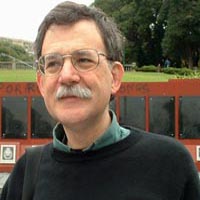I just wanted to remind potential doctoral students in history that George Mason University and the Roy Rosenzweig Center for History and New Media have Digital History Research Awards for students entering the History and Art History doctoral program. Students receiving these awards will get five years of fully funded studies, as follows: $20,000 research stipends in years 1 and 2; research assistantships at RRCHNM in years 3, 4, and 5. Awards include fulltime tuition waivers and student health insurance. For more information, contact Professor Cynthia A. Kierner (Director of the Ph.D. Program) at ckierner@gmu.edu, or yours truly at dcohen@gmu.edu. The deadline for applications is January 15, 2013.
Category: Fellowships
The American Historical Association Announces the Roy Rosenzweig Fellowship for Innovation in Digital History
A very special announcement:
 In 2009, George Mason University and the American Historical Association will offer the first Roy Rosenzweig Fellowship for Innovation in Digital History. This award was developed by friends and colleagues of Roy Rosenzweig (1950–2007), Mark and Barbara Fried Professor of History and New Media at George Mason University, to honor his life and work as a pioneer in the field of digital history.
In 2009, George Mason University and the American Historical Association will offer the first Roy Rosenzweig Fellowship for Innovation in Digital History. This award was developed by friends and colleagues of Roy Rosenzweig (1950–2007), Mark and Barbara Fried Professor of History and New Media at George Mason University, to honor his life and work as a pioneer in the field of digital history.
This nonresidential fellowship will be awarded annually to honor and support work on an innovative and freely available new media project, and in particular for work that reflects thoughtful, critical, and rigorous engagement with technology and the practice of history. The fellowship will be conferred on a project that is either in a late stage of development or which has been launched in the past year but is still in need of further improvements. The fellow(s) will be expected to apply awarded funds toward the advancement of the project goals during the fellowship year.
In a 1-2 page narrative, entries should provide a method of access to the project (e.g., web site address, software download), indicate the institutions and individuals involved with the project, and describe the project’s goals, functionality, intended audience, and significance. A short budget statement on how the fellowship funds will be used should be attached. Projects may only be submitted once for the Rosenzweig Fellowship.
The entry should be submitted by e-mail to rosenzweigprize@historians.org. Questions about the prize and application process should be directed to rtownsend@historians.org. The deadline for submission of entries is May 15, 2009. Recipients will be announced at the 2010 AHA Annual Meeting in San Diego.
Reminder: Possible NEH Fellowship at CHNM
Just a reminder to those who are interested that there’s only a week left to get your application in for the potential National Endowment for the Humanities Fellowship at the Center for History and New Media. This is a terrific program that NEH has set up, and a real opportunity for fellows to learn from our experience and vice versa.
Potential Fellowship at CHNM
The Center for History and New Media (CHNM, http://chnm.gmu.edu) at George Mason University invites expressions of interest to join the Center in applying to the National Endowment for the Humanities for one of NEH’s Fellowships at Digital Humanities Centers.
NEH Fellowships at Digital Humanities Centers (FDHC) support collaboration between digital centers and individual scholars. An award provides funding for both a stipend for the fellow while in residence at the center and a portion of the center’s costs for hosting a fellow. Awards are for periods of six to twelve months. The intellectual cooperation between the visiting scholar and the center may take many different forms and may involve humanities scholars of any level of digital expertise. Fellows may work exclusively on their own projects in consultation with center staff, collaborate on projects with other scholars affiliated with the center, function as “apprentices” on existing digital center projects, or any combination of these. The results of the collaboration may range from “proof of concept” to finished product.
The aims of the program are to 1) support innovative collaboration on outstanding digital research projects; 2) expand digital literacy and expertise; 3) promote the work of digital humanities centers; and 4) encourage broad and open access to the humanities. (For the full guidelines, see http://www.neh.gov/grants/guidelines/fdhc.html)
CHNM plans to select a scholar for its application by July 31, 2008. Interested scholars should send a CV and a 2-3 pp. description of 1) their general interest in the fellowship and the Center; 2) what specifically they would like to work on during the term of the fellowship; 3) any experience they might have that is applicable to this work; and 4) how this work dovetails with any current Center projects (e.g. the National History Education Clearinghouse, Zotero, Omeka, the Bracero History Archive, etc.) Send these two documents to chnm@gmu.edu with the subject line “NEH Fellowship” as soon as possible. Applications will be reviewed as they come in, through July 31. The selected scholar will be notified soon thereafter, and CHNM will work with that scholar to submit a grant application to NEH by September 15, 2008.
2007 Vectors Summer Fellowships
Vectors: Journal of Culture and Technology in a Dynamic Vernacular has announced its fourth annual summer fellowship program to take place in June 2007 at USC. They are seeking proposals for projects related to “reading” and “noise.” About Vectors: “Vectors publishes work which need necessarily exist online, ranging from archival to experimental projects.”
The Hindle Fellowship in the History of Technology
Those with a recent doctorate in the history of technology or a related field might be interested in applying for this fellowship, which provides $10,000 for the purpose of preparing a dissertation for publication. The deadline is April 1, 2007.